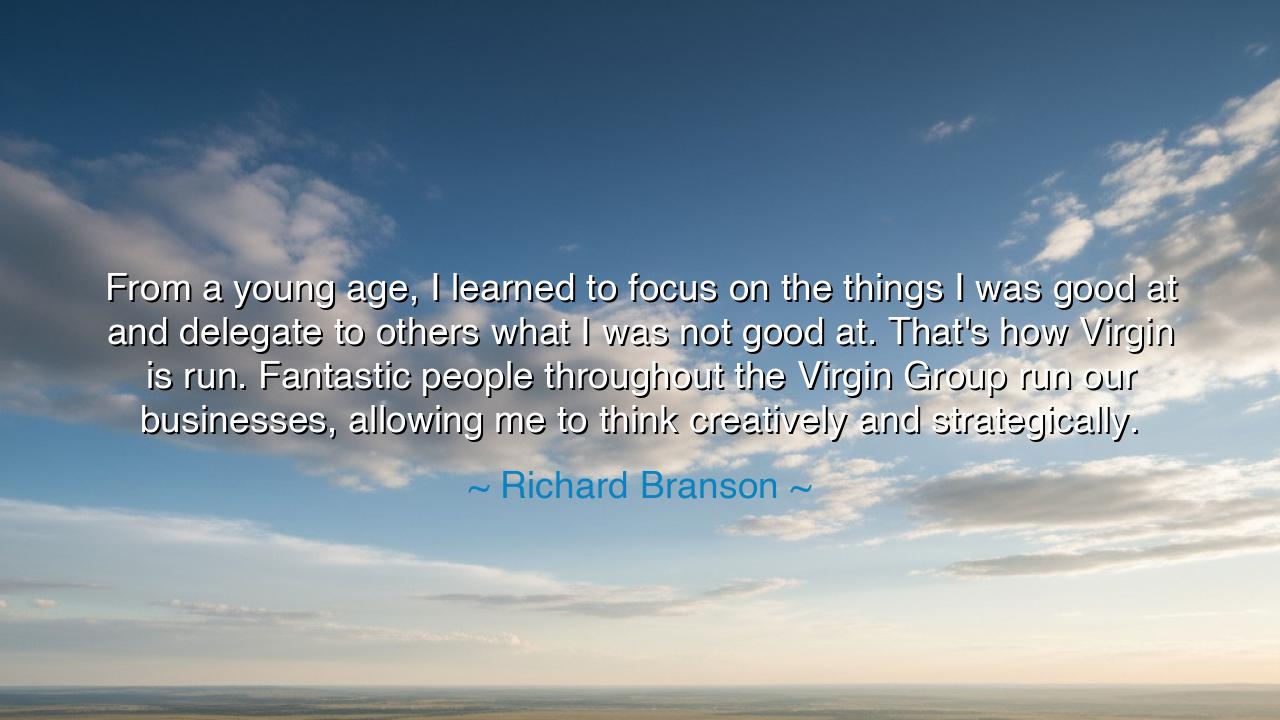
From a young age, I learned to focus on the things I was good at
From a young age, I learned to focus on the things I was good at and delegate to others what I was not good at. That's how Virgin is run. Fantastic people throughout the Virgin Group run our businesses, allowing me to think creatively and strategically.






The visionary and adventurer Richard Branson, whose life has been a testament to daring and imagination, once said: “From a young age, I learned to focus on the things I was good at and delegate to others what I was not good at. That's how Virgin is run. Fantastic people throughout the Virgin Group run our businesses, allowing me to think creatively and strategically.” In these words lies a profound philosophy — one that transcends business and touches the art of living itself. Branson speaks of self-knowledge, trust, and collaboration, the three pillars upon which all great endeavors stand. His wisdom reminds us that greatness is not born from doing everything alone, but from knowing one’s strengths, embracing one’s limitations, and building harmony with others to achieve what no single person could accomplish.
The origin of this quote is deeply rooted in Branson’s own journey. From his youth, he struggled with dyslexia, a challenge that made traditional learning and detailed management difficult. Yet what many would have seen as a weakness became his teacher. Unable to master every detail, he learned to see the bigger picture, to imagine what others could not, and to surround himself with those who could turn his visions into reality. When he founded Virgin Records, and later Virgin Atlantic and Virgin Galactic, he did not lead by control, but by trust. He built empires not by doing everything himself, but by empowering others to shine in their expertise. Thus, his empire became not a tower of one man’s labor, but a living network of brilliant minds working in harmony.
Branson’s teaching echoes the wisdom of the ancients, for even the greatest leaders of old understood that power lies not in command alone, but in delegation and unity. Consider Alexander the Great, who conquered the known world before the age of thirty. Though he was a master strategist, he did not fight every battle nor govern every province himself. He surrounded himself with generals like Parmenion and Hephaestion, and trusted their strengths as extensions of his own. His greatness was magnified by his ability to inspire loyalty, to recognize talent, and to build a fellowship of excellence. So too does Branson’s philosophy carry that same timeless truth: that no kingdom — whether of nations or of ideas — is built by one pair of hands.
When Branson says he focuses on “the things I was good at,” he speaks not from arrogance, but from clarity of purpose. Too often, people are consumed by the illusion that to be worthy, one must master all things. But this is the path to mediocrity. The wise instead concentrate their energy where it can yield the greatest light. They hone their gifts and entrust others to bring their own strengths to the table. Such humility is not weakness — it is the foundation of greatness. By acknowledging what one cannot do, one invites others to contribute, and thus transforms a solitary effort into a symphony of human potential.
The meaning of Branson’s words extends beyond business and into the heart of every human calling. In a world that prizes independence, he reminds us that interdependence is the higher virtue. The artist who seeks perfection alone may create beauty, but the one who collaborates may build wonders that endure. The scientist who shares his discoveries multiplies knowledge a thousandfold. The leader who trusts others ignites a flame that outlives him. Branson’s life demonstrates that to build something truly vast — a company, a movement, a dream — one must trade control for faith in others, and in doing so, create a legacy of shared excellence.
Consider also the story of Thomas Edison, the great inventor. Though history often credits him alone for countless creations, Edison was surrounded by teams of engineers, chemists, and thinkers who turned his visions into reality. He once said, “I am not a great inventor. I am a sponge. I absorb ideas and make them live.” Like Branson, he understood that innovation is not born in isolation. It thrives in collaboration, in the merging of many minds toward a single purpose. It is through delegation and trust that dreams become institutions, and ideas become revolutions.
The lesson, then, is clear: to live and lead well, one must first know oneself — one’s strengths and one’s limits — and then weave those truths into the tapestry of community. Focus your energy where your passion burns brightest. Delegate not out of laziness, but out of respect for the gifts of others. Surround yourself with those who challenge and complement you, for no single flame can light the world, but a thousand together can banish the dark. As Branson shows, the path to greatness is not the lonely climb of a single figure, but the shared ascent of many hearts aligned by vision.
Thus remember, O builder of dreams, that wisdom begins with humility. Do not seek to be master of all things, for such ambition is folly. Instead, master yourself — and learn to see the greatness in others. When you do, your work will outlive you, your influence will spread like light, and your name will be carried not by your hands alone, but by the countless souls you have lifted. For as Richard Branson teaches, success is not the triumph of one, but the harmony of many — and in that harmony lies the eternal music of creation.






AAdministratorAdministrator
Welcome, honored guests. Please leave a comment, we will respond soon